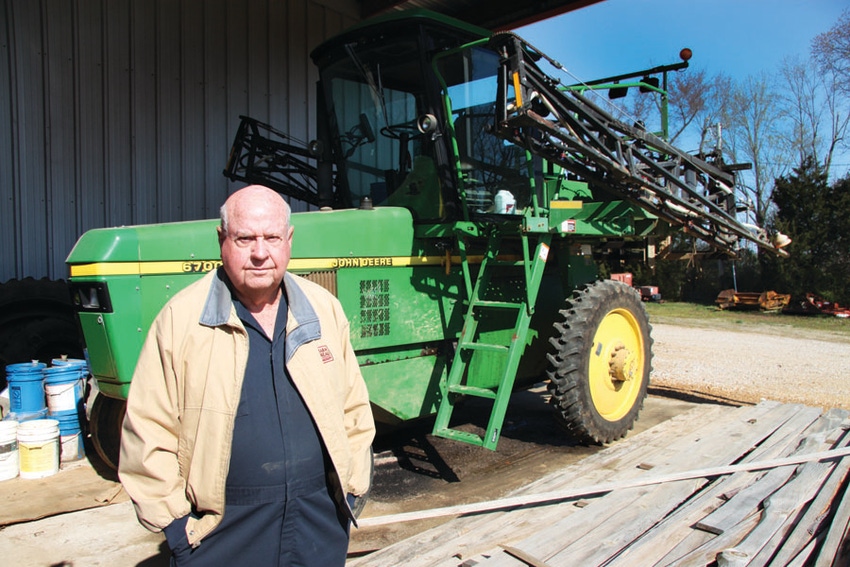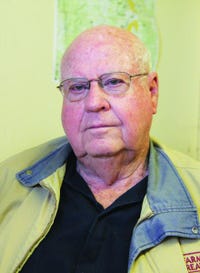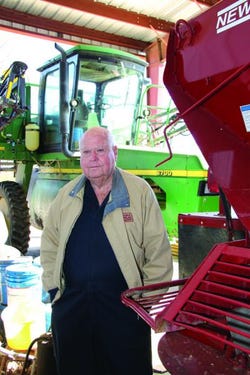
"On our hill land, for non-irrigated production, I don’t think there’s a better crop than cotton," says Oxford, Miss. grower Don Waller, who at 81 is looking forward to another crop this year. "With no-till, Roundup Ready technology, and stacked trait varieties, I think we can grow it here in the hills cheaper than anywhere in Mississippi. For me, it’s by far the least risky crop option."

Don Waller celebrated his 81st birthday April 6, commemorating not only eight decades of life, but nearly 60 years as a farmer, founder and owner of a successful funeral home business, and an eight-year term, 1988-1996, as president of the 200,000 member Mississippi Farm Bureau Federation.
And he’s looking forward, come early May, to planting another crop of cotton, which has been the one and only row crop on his farm near Oxford, Miss., for the past 40 years.
“I still feel good, still enjoy what I do,” he says, “and as long as I’m physically and mentally able, I have no plans to retire. I’d be totally miserable.
“I’ve had some great experiences, great travel opportunities during my Farm Bureau tenure, and business success beyond farming — but first and foremost, I’ve always been a farmer. There has never been a day that I woke up in the morning dreading what I had to do on the farm that day.”
Since he started farming on his own in 1954, Waller says, he’s been involved in various enterprises in addition to cotton. “I’ve tried almost everything — poultry, cattle, hogs — but cotton was always the backbone of the operation. Some of my land has never had anything on it but cotton.”
He hasn’t been tempted by the high prices for corn and soybeans in recent years.
“All my equipment is geared to cotton, and at this stage of my life, I have no wish to expand or move into other crops. On our hill land, for non-irrigated production, I don’t think there’s a better crop than cotton. With no-till, Roundup Ready technology, and stacked trait varieties, I think we can grow it here in the hills cheaper than anywhere in Mississippi. For me, it’s by far the least risky crop option.
“Roundup Ready has been the key that made no-till production workable. Before it came along, everybody laughed that ‘no-till means no-yield,’ but being able to go over the top with Roundup made all the difference in the world.”
And the boll weevil eradication effort eliminated a pest that had robbed farmers of yields for decades, adding an extra measure of profit potential to cotton, Waller says.
“The eradication program got under way when I was Farm Bureau president, and I was proud to join farmers in Mississippi and across the cotton belt in supporting the effort. It took a long time and a lot of money, but it has been of tremendous value to the cotton industry, and will be of benefit to growers for years to come.
“All these developments have been the salvation for cotton producers.”
The current sharp cutback in U.S. cotton production — with one of the lowest acreages ever expected in Mississippi this year — is a concern, he says.
Concern for cotton infrastructure
“The big factor is the potential loss of important infrastructure. We need for there to be enough cotton to keep our gins, warehouses, dealers and suppliers, repair shops, etc., in business. I believe cotton will come back — it will just take time to work out from under the oversupply situation we’re in. I hope all these infrastructure components can hold on until that happens.”

DON WALLER says cotton has been the backbone of his farming operation for nearly 60 years, and for the past 40 years he’s grown only cotton.
Even before he started farming on his own in 1954, Waller’s life was centered around cotton.
“I was born just down the road from here. My father, Percy Waller, farmed here, and I grew up helping out on the farm. We were plowing with mules and still had sharecropper families living on the farm. We chopped out weeds by hand, picked the cotton by hand. There were years the boll weevil took a heavy toll on the crop. But we managed to hang on.
“We had maybe 100 acres of cotton and grew some corn for the mules. In most years, we’d make a half-bale to three-quarters bale. I don’t know how we made the yields we did. When we were first able to mount sprayers on tractors and spray for the boll weevil, things got somewhat better.”
Even when he was going to school at Ole Miss, Waller says, “I kept farming — I scheduled all my classes in the morning so I could do farm work in the afternoons.
“The Wallers have been here a long time. My grandfather, Morgan Waller, bought land and settled here in 1904. After he died, my father later bought the 360-acre home place from his estate. When my late wife, Patsy, and I married, we lived in my grandfather’s house. In later years, we moved it elsewhere on the farm and built a new house.”
When Waller began farming full time, he and his father formed a partnership. “Over the years I’ve bought my uncle’s place and other land here and there, and I also rent some land from the Corps of Engineers near Sardis Lake. I’m now farming in five different locations, but five miles is the farthest I have to travel to any of the farms.”
In 1977, Waller says, his wife, who had held a county elective office for many years, was looking for a career change, and “we saw a need for another funeral home to serve the area.
“We started Waller Funeral Home, which she managed, and I helped out as needed. It was a tough business to get started, and the struggles we had were as demanding as anything on the farm. But with her hard work, it became successful and now is an integral part of this community.
“After her death, our daughter, Beth Rosson, and her husband, Bob, took it over and now operate it. Their son, my grandson Brett, works there too, but he also works with me here on the farm. He understands all the computer, GPS, and other technology. Two funeral home workers also help here on the farm at planting, harvest, and other times.”
The evolution of machinery, chemicals, varieties, and production systems during his farming years has been nothing short of astounding, Waller says. “Those advancements changed farming for everyone.
“Our first mechanical picker was a 1-row International Harvester that we bought used. I remember to this day going to pick it up south of Memphis and driving it back to the farm. People along the highway would stop and look at it — it was such an unusual sight in those days.
Less equipment with no-till
“Most of the equipment I use now was bought in the 1990s. With no-till, I don’t really have need for a lot of tractor power any more. One of my tractors has never been used for anything but pulling the planter; another I use with a dirt pan and for other jobs. They have less than 2,000 hours on them. Less use, of course, reduces fuel and maintenance costs.

NO-TILL FARMING has significantly reduced his equipment needs, says Don Waller. “I just don’t need a lot of tractor power any more.”
“I have a self-propelled John Deere sprayer for chemical applications and to apply liquid nitrogen. The spreader truck, for applying potash and phosphorus, is equipped with GPS for greater accuracy and efficiency. That’s pretty much the extent of equipment that I use on a regular basis.
“My picker is an International 420 4-row machine, the last 4-row model they made, and it still serves my needs adequately. We do all our own maintenance, unless it’s something major.”
He soil tests every year. “I try to maintain pH in the 6.0 to 7.0 range, and to keep P and K at optimum levels. I plant fully loaded Deltapine varieties exclusively. I’ve tried most varieties over the years, but these seem to work best year-in and year-out. Deltapine DP 0912 B2RF has been a very good variety, and I’ve grown some of their 2010 class and 2011 class varieties. Last year, I averaged 950 pounds.”
Thus far, Waller says, he’s had no resistant pigweeds. “There have been a few resistant marestails, but nothing that’s been a real problem. I’ve never used anything but Monsanto’s Roundup in my weed control program; it has worked well from day 1, and I’ve stuck with it.
“With the weevil eradicated and with Bt technology, we don’t have many insect problems. Depending on the season, I may spray two or three times for plant bugs and occasionally for a flare of aphids or stink bugs.
“Insect control technology has come a long way since the days of DDT, malathion, and the really potent chemicals. Now, we’re applying materials at ounces, or fractions of an ounce per acre, and they’re much more benign in the environment.”
While most farmers cuss them for other reasons, Waller says he believes the fire ants in his fields are “a pretty good insect control ally. They really go after aphids or any egg-laying insect. They can be a pain at harvest time, or when I’m out walking in the field, but I think they’re of some benefit in helping to control some insects.”
He applied his burndown application in early March, and says it has worked well despite the wet, cold weather that occurred on into April.
“I seldom plant cotton before May 1, and try to get everything in during the first two weeks of that month. We’ll generally start harvesting in early October.”
He and five other farmers in the area own the Taylor-Lafayette Gin at Taylor, Miss., where his cotton is ginned. “The gin processed about 12,000 bales last year, which was one of the smallest volumes we’ve had over the years,” Waller says. His cotton is marketed through Staplcotn. He also serves on the board of directors and the executive committee of Delta Oil Mill.
Timber market in doldrums
In addition to his 850 acres of cotton, Waller has 1,000 acres in pines and hardwoods, and some pasture land that he rents to a neighbor.
“The timber market has been terrible since the housing crisis hit,” he says. “Pulpwood prices have been decent recently, and I’ve done some thinning here and there, but I’m trying to hold off on any logging sales until the market recovers.”
Waller, who says he has been involved with Farm Bureau all his farming life, considers it “a great privilege” to have served as president of the Mississippi organization from 1988-1996.
“It was a great honor to be chosen by the membership to lead the organization. It gave me the opportunity to work with a lot of really outstanding people at the state and national levels (I was on the board of the American Farm Bureau Federation), to work with a lot of the key leaders in Washington, and to travel internationally — China, Israel, Germany, Austria, and many other places. I kept a suitcase packed all the time.
“Farm Bureau’s Farm Families of Mississippi promotion campaign, which has been under way the last couple of years and is co-sponsored by a lot of individuals and businesses in the state, is an excellent program to help create awareness of the importance of agriculture.
“The public now is so removed from any connection to agriculture, we need to do everything we can to make them aware of how good we in the U.S. have it in terms of bountiful food and fiber.”
He also is appreciative of all the people he met and worked with when his brother, the late Bill Waller, served as Mississippi’s governor from 1972 to 1976.
As he moves into his ninth decade, Waller says he’s happy that he’s able to continue farming. He remarried in December 2011 and says he and his wife, Mary Lee, are now “just living the quiet life.
“I’ve got some great farmer neighbors, and we’re always ready to help each other. If I need something, they help me; if they need something, I help them. There are just no better folks than farmers.”
You might also be interested in:
Contaminants a thorn in the side of U.S. cotton exports
NCC stresses importance of effective STAX
A buyer’s market for urea?
About the Author(s)
You May Also Like



